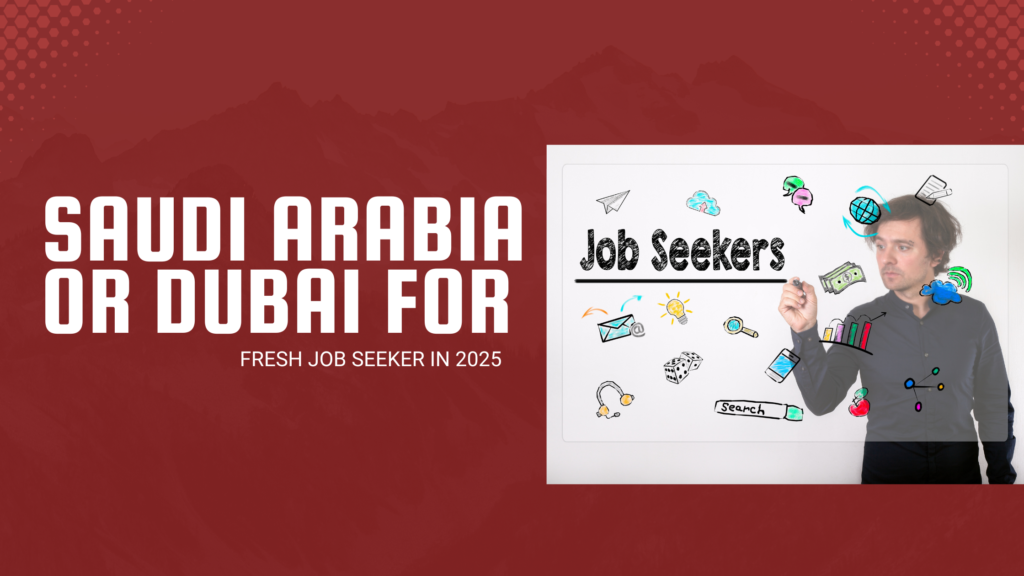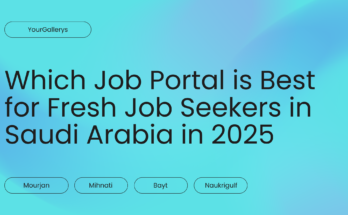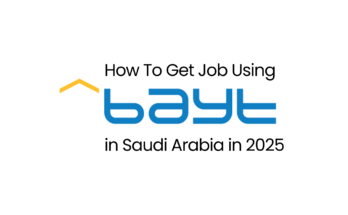Introduction
For fresh job seekers looking to kickstart their careers in 2025, the Middle East continues to offer exciting prospects. Dubai and Saudi Arabia stand out as two of the most promising destinations. Both locations are undergoing rapid economic growth, diversifying their industries, and attracting global talent. However, choosing between the two can be challenging. Factors such as economic stability, job market trends, salary packages, work culture, and lifestyle can influence a job seeker’s decision. In this article, we’ll break down the opportunities and challenges in both regions to help you make an informed choice.

Economic Landscape in 2025
Economic growth plays a pivotal role in shaping job opportunities. Both Dubai and Saudi Arabia are positioned for significant expansion, but each with its own unique focus.
Dubai’s Economy and Job Market
Dubai has long been a global hub for trade, tourism, and finance. As of 2025, the city is strengthening its position as a leader in innovation and digital transformation. The government’s efforts to diversify from oil dependency have led to investments in technology, green energy, and smart city projects. Dubai’s free economic zones and tax incentives continue to attract multinational companies, making it a magnet for fresh graduates in fields like IT, finance, and logistics.
Key points about Dubai’s economy in 2025:
- Focus on fintech, AI, and renewable energy.
- Major infrastructure projects leading to job openings.
- Strong startup ecosystem providing opportunities for entrepreneurial minds.
For fresh job seekers, this means a wealth of opportunities in both established corporations and innovative startups.
Saudi Arabia’s Economic Vision and Opportunities
Saudi Arabia’s Vision 2030 is a blueprint for transforming the country into a diversified economy. By 2025, major initiatives under this vision will have matured, especially in sectors like tourism, entertainment, and green technology. The development of mega-projects such as NEOM—a futuristic smart city—offers unparalleled job prospects in various fields including engineering, technology, and sustainable development.
Key points about Saudi Arabia’s economy in 2025:
- Heavy investment in renewable energy and sustainable technologies.
- Expanding tourism and hospitality sectors.
- Government support for entrepreneurship and innovation.
Saudi Arabia’s proactive approach to economic diversification presents promising opportunities for job seekers looking to be part of groundbreaking projects.
Also Read: Which Job portals in Saudi Arabia is Best for Fresh Job Seekers in 2025?
Popular Sectors for Employment
Both Dubai and Saudi Arabia have thriving industries, but the dominant sectors differ based on their strategic goals.
Growing Industries in Dubai
Dubai’s focus on technology and innovation is evident in its job market. The city’s status as a tourist hotspot also fuels demand in hospitality and entertainment.
- Technology and IT: Digital transformation initiatives are driving demand for software developers, data analysts, and cybersecurity experts.
- Tourism and Hospitality: Dubai’s world-class hotels and tourism attractions constantly need skilled professionals.
- Real Estate and Construction: Large-scale projects like the Dubai Expo site redevelopment are creating jobs in real estate and urban planning.
Booming Sectors in Saudi Arabia
Saudi Arabia’s ambitious projects under Vision 2030 are reshaping its job market. The country’s focus on sustainability and infrastructure is creating diverse opportunities.
- Energy and Green Tech: Saudi Arabia’s leadership in renewable energy is driving demand for engineers and environmental scientists.
- Construction and Engineering: Mega-projects like NEOM and the Red Sea Project are massive employment hubs.
- Entertainment and Culture: New cultural and entertainment initiatives are opening roles in event management, arts, and media.
Salaries and Compensation Packages
One of the biggest factors for job seekers is the potential earning capacity. While both Dubai and Saudi Arabia offer tax-free salaries, there are differences in pay scales and benefits.
Salary Trends in Dubai
Dubai is known for offering competitive salaries, especially in high-demand sectors. Additionally, employees benefit from tax-free income, housing allowances, and health insurance.
- Entry-level IT jobs: Average salary of AED 8,000 to AED 12,000 per month.
- Hospitality sector: Salaries range from AED 5,000 to AED 10,000 per month, depending on the role.
The cost of living in Dubai can be high, especially for housing, but many companies offer attractive relocation packages.
Competitive Pay in Saudi Arabia
Saudi Arabia’s salary packages have become increasingly attractive, especially with the government’s push to bring in global talent. Tax-free salaries, along with generous allowances for housing, transportation, and education, make it a lucrative destination.
- Engineering roles in mega-projects: SAR 10,000 to SAR 15,000 per month for entry-level positions.
- Hospitality and tourism: Salaries typically range from SAR 6,000 to SAR 12,000 per month.
In many cases, Saudi Arabia offers lower living costs compared to Dubai, making it easier to save money.
Work Culture and Environment
Cultural fit and work-life balance are critical considerations for job seekers. Both Dubai and Saudi Arabia offer distinct working environments.
Work-Life Balance in Dubai
Dubai’s work culture is fast-paced and highly competitive, reflecting its global nature. However, the city also places a strong emphasis on leisure and lifestyle, with a variety of recreational options available.
- Work hours: Typically 40-48 hours per week.
- Work culture: Collaborative and diverse, with a mix of nationalities.
Employees in Dubai often enjoy weekends filled with shopping, beach outings, and cultural events, offering a good balance between work and play.
Saudi Arabia’s Work Environment
Saudi Arabia’s work culture is evolving rapidly, especially with an influx of expatriates and a focus on modernizing workplaces. Traditional values still hold importance, but there’s a growing emphasis on innovation and collaboration.
- Work hours: Generally 40 hours per week.
- Work culture: More structured, but with increasing flexibility in some industries.
Saudi Arabia’s push for modernization means employees can expect a blend of traditional and modern work experiences, with plenty of opportunities for professional growth.
Lifestyle and Living Conditions
When deciding between Dubai and Saudi Arabia, lifestyle plays a crucial role, especially for fresh job seekers who might be relocating for the first time. Both locations offer unique living experiences, with differences in culture, entertainment, and overall quality of life.
Living in Dubai
Dubai is renowned for its luxurious lifestyle, modern infrastructure, and vibrant expat community. The city is home to world-class malls, restaurants, beaches, and entertainment venues, offering a cosmopolitan lifestyle.
- Accommodation: Housing options range from high-rise apartments to villas. Popular areas include Dubai Marina, Downtown Dubai, and Jumeirah. However, rent can be expensive, and job seekers should factor in accommodation allowances when negotiating salaries.
- Transportation: Dubai has a well-developed public transport system, including metro, buses, and taxis. Many residents also prefer to own cars due to the availability of affordable vehicles and low fuel costs.
- Entertainment and Leisure: The city hosts numerous events, concerts, and festivals. Popular attractions include the Burj Khalifa, Dubai Mall, and desert safaris. Additionally, Dubai’s beaches and nightlife are major draws for young professionals.
Pros of living in Dubai:
- Diverse and multicultural environment.
- Wide range of recreational activities.
- High standard of living and safety.
Challenges:
- High cost of living, especially for housing and schooling.
- Hot climate, especially during summer months.
Living in Saudi Arabia
Saudi Arabia offers a more traditional lifestyle, although rapid modernization is transforming cities like Riyadh, Jeddah, and Dammam. The Kingdom’s focus on developing tourism and entertainment sectors has opened up more leisure options for residents.
- Accommodation: Housing is generally more affordable compared to Dubai. Expatriates can choose from a variety of options, including gated communities and modern apartments in urban areas.
- Transportation: Public transport is still developing, but major cities have introduced metro systems and ride-hailing services like Uber. Owning a car is common due to the vast distances between locations.
- Entertainment and Leisure: With the easing of social restrictions, Saudi Arabia now offers cinemas, concerts, and sporting events. Key attractions include historical sites, beaches, and festivals like Riyadh Season.
Pros of living in Saudi Arabia:
- Lower cost of living compared to Dubai.
- Opportunities to explore cultural and historical landmarks.
- Growing expat community and social scene.
Challenges:
- More conservative culture, which may require some adjustment.
- Limited nightlife options compared to Dubai.
Visa and Residency Requirements
Understanding visa policies is crucial for fresh job seekers planning to work in either Dubai or Saudi Arabia. Both regions have streamlined processes for attracting skilled workers.
Dubai’s Visa Policies
Dubai offers various visa options tailored to job seekers, including employment visas, freelance visas, and the Golden Visa for high-skilled professionals.
- Employment visa: Sponsored by employers and valid for up to three years.
- Freelance visa: Allows individuals to work independently in sectors like media, technology, and education.
- Golden Visa: Long-term residency for investors, entrepreneurs, and specialized talent.
Dubai’s ease of obtaining a work visa, combined with its reputation as a business hub, makes it an attractive destination for fresh graduates.
Saudi Arabia’s Residency Programs
Saudi Arabia has introduced several initiatives to attract foreign talent, including the Premium Residency program.
- Employment visa: Similar to Dubai, employment visas in Saudi Arabia are employer-sponsored.
- Premium Residency (Green Card): Offers expats permanent residency without the need for a local sponsor, allowing greater freedom to work and invest.
These policies reflect Saudi Arabia’s commitment to creating a more inclusive and business-friendly environment for expatriates.
Networking and Career Growth Opportunities
Networking is vital for career advancement, and both Dubai and Saudi Arabia offer platforms for professionals to connect and grow.
Networking in Dubai
Dubai hosts numerous industry-specific events, conferences, and expos, providing excellent opportunities for fresh job seekers to network with industry leaders.
- Key events: GITEX (technology), Arabian Travel Market (tourism), and various job fairs.
- Professional organizations: Joining local business councils and networking groups can enhance career prospects.
The city’s vibrant business ecosystem encourages collaboration and innovation, making it easier for newcomers to build valuable connections.
Networking in Saudi Arabia
Saudi Arabia’s growing emphasis on business and innovation has led to an increase in networking events and professional gatherings.
- Key events: Future Investment Initiative (finance), LEAP (technology), and various sector-specific summits.
- Entrepreneurship hubs: Co-working spaces and incubators like King Abdullah Economic City (KAEC) provide platforms for collaboration.
For job seekers eager to be part of Saudi Arabia’s transformation, these networks offer a chance to engage with industry pioneers and thought leaders.
Cost of Living Comparison
A critical factor for fresh job seekers is the cost of living. While both locations are tax-free, expenses such as housing, food, and transportation differ.
Cost of Living in Dubai
Dubai is known for its relatively high cost of living. Housing and schooling are the biggest expenses for most residents.
- Average rent: AED 5,000 to AED 12,000 per month, depending on the location and property type.
- Utilities and internet: Around AED 1,000 to AED 1,500 per month.
- Groceries and dining: Dining out can be expensive, but budget-friendly options are available in areas like Deira and Al Karama.
Despite the higher costs, Dubai’s lifestyle perks and earning potential often outweigh the expenses.
Education and Family-Friendly Environment
For job seekers who plan to relocate with their families, access to quality education and a family-friendly environment can be a decisive factor. Both Dubai and Saudi Arabia have made significant investments in these areas.
Education in Dubai
Dubai is home to a wide range of international schools offering curricula such as British, American, IB (International Baccalaureate), and Indian. The quality of education is generally high, but tuition fees can be expensive.
- Top international schools: Dubai International Academy, GEMS Education, and Repton School.
- Higher education: Universities such as the University of Dubai and the American University in Dubai attract students from around the world.
- Family-friendly amenities: Dubai has numerous parks, recreational centers, and family-oriented events, making it a great place for children.
Pros for families:
- Access to high-quality education and extracurricular activities.
- Safe and clean environment.
- Abundance of family-friendly entertainment options, including theme parks and beaches.
Challenges:
- High tuition fees for international schools.
- Balancing work and family life in a fast-paced city.
Education in Saudi Arabia
Saudi Arabia is also investing heavily in education as part of Vision 2030. Many international schools cater to expatriate families, offering curricula similar to those found in Dubai.
- Top schools: The British International School of Riyadh, American International School, and Al-Khozama International School.
- Higher education: Institutions like King Abdullah University of Science and Technology (KAUST) are globally recognized for their academic excellence.
- Family life: Saudi Arabia’s cultural emphasis on family ensures that many residential areas and facilities are designed with families in mind.
Pros for families:
- More affordable schooling compared to Dubai.
- Cultural emphasis on family values.
- Growing entertainment options, including family-friendly attractions like amusement parks and festivals.
Challenges:
- Adjusting to cultural norms and regulations.
- Limited variety of extracurricular activities compared to Dubai.
Social Life and Expat Community
A supportive social network can make a significant difference when relocating to a new country. Both Dubai and Saudi Arabia have thriving expat communities, but the experiences differ.
Social Life in Dubai
Dubai’s cosmopolitan atmosphere makes it easy for expatriates to find social groups and build connections. The city is known for its vibrant social scene, including networking events, cultural festivals, and nightlife.
- Expat community: Dubai is home to people from over 200 nationalities, making it one of the most diverse cities in the world.
- Social activities: From beach clubs to rooftop lounges, Dubai offers a range of entertainment options. Fitness enthusiasts can join gyms, yoga studios, and sports clubs.
- Cultural events: Annual events like the Dubai Shopping Festival and Global Village celebrate diversity and attract millions of visitors.
Advantages:
- Easy to make friends and network.
- Wide range of social and recreational options.
- Inclusive environment for expatriates.
Considerations:
- Some may find the fast-paced lifestyle overwhelming.
- Certain areas can be expensive for leisure activities.
Social Life in Saudi Arabia
Saudi Arabia’s social scene has evolved significantly, with more entertainment options and relaxed regulations in recent years. While still more conservative than Dubai, the country offers various ways for expatriates to engage socially.
- Expat community: Cities like Riyadh, Jeddah, and Dammam have growing expat populations, fostering a sense of community.
- Social activities: Cafes, cultural events, and fitness clubs are popular gathering spots. The introduction of cinemas, concerts, and festivals has added more social opportunities.
- Cultural experiences: Saudi Arabia’s rich history and cultural heritage offer unique experiences, from exploring ancient ruins to attending traditional festivals.
Advantages:
- Opportunities to experience authentic Arabian culture.
- More relaxed social norms in recent years.
- Close-knit expat communities.
Considerations:
- Social life may be more structured and require adaptation to local customs.
- Limited nightlife compared to Dubai.
Safety and Security
Safety is a top priority for job seekers and expatriates. Both Dubai and Saudi Arabia are known for their low crime rates and strict law enforcement.
Safety in Dubai
Dubai is considered one of the safest cities in the world. The government’s strict laws and effective policing contribute to a secure environment for residents and tourists alike.
- Crime rate: Extremely low, with stringent penalties for offenses.
- Public safety: Well-lit streets, extensive surveillance, and a visible police presence ensure a sense of security.
- Emergency services: Dubai’s healthcare and emergency services are world-class, with quick response times.
Safety in Saudi Arabia
Saudi Arabia also boasts a strong record of public safety, with a focus on maintaining law and order. The government has implemented various measures to ensure the security of residents and expatriates.
- Crime rate: Low, with strict enforcement of laws.
- Public safety: High level of security in public spaces, especially around major events and tourist sites.
- Healthcare and emergency services: Comprehensive healthcare facilities are available, with continued investments in improving services.
Conclusion Between Which Country is Best for Fresh Job Seekers in 2025?
Choosing between Dubai and Saudi Arabia depends on personal preferences, career goals, and lifestyle expectations. Dubai offers a fast-paced, cosmopolitan environment with abundant job opportunities in technology, finance, and tourism. It is ideal for those seeking a vibrant social life and a diverse work culture. However, the high cost of living is a factor to consider.
On the other hand, Saudi Arabia is rapidly transforming, with ambitious projects and growing industries offering unique opportunities for fresh job seekers. It is a great option for those who value a more affordable lifestyle and want to be part of groundbreaking developments.
Ultimately, both destinations promise exciting prospects in 2025, making either choice a rewarding experience for fresh graduates ready to embark on their careers.
If you want our help then Contact us Here or Via email info@yourgallerys.com
FAQs
1. Which country offers better salaries for fresh job seekers, Dubai or Saudi Arabia?
Both countries offer competitive, tax-free salaries. Dubai’s salaries may be slightly higher in sectors like finance and IT, but Saudi Arabia often compensates with lower living costs and generous allowances.
2. Is it easier to find a job in Dubai or Saudi Arabia in 2025?
Dubai has a more established job market with a focus on international talent, while Saudi Arabia is rapidly expanding its opportunities under Vision 2030. Both offer ample job openings, but Dubai might be quicker for certain sectors.
3. What industries are booming in Saudi Arabia and Dubai?
Dubai is thriving in technology, tourism, and real estate. Saudi Arabia is focusing on energy, sustainable technology, and mega-projects like NEOM.
4. How does the cost of living compare between Dubai and Saudi Arabia?
Dubai has a higher cost of living, especially for housing and schooling. Saudi Arabia offers a more affordable lifestyle with lower rents and everyday expenses.
5. Can I bring my family if I get a job in Dubai or Saudi Arabia?
Yes, both countries allow expatriates to bring their families. Employers often provide family benefits, including housing and education allowances.

